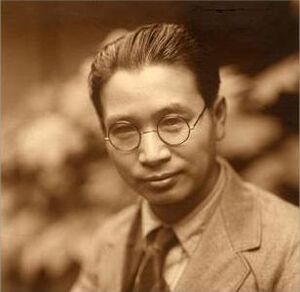Toyohiko Kagawa

Toyohiko Kagawa (10 July 1888 – 23 April 1960) was a Japanese labor activist who wrote, spoke, and worked at length on ways to employ Christian principles in the ordering of society and in cooperatives. His vocation to help the poor led him to live among them, where he established schools, hospitals, and churches.
While studying at Princeton University, Kagawa read Tree Crops: A Permanent Agriculture by J. Russell Smith. Inspired by this book, he managed to persuade many of Japan's upland farmers during the 1930s that the solution to their soil erosion problem lay in widespread tree-planting. Kagawa also advised that they could receive further benefit if they planted crop trees, such as quick-maturing walnuts, to provide feed for their pigs.
The planting of fruit and nut trees on farmland aims to conserve the soil, supply food for humans, and provide animal fodder. Kagawa was a forerunner of modern forest farming and an inspiration to Robert Hart who pioneered forest gardening in temperate climates.